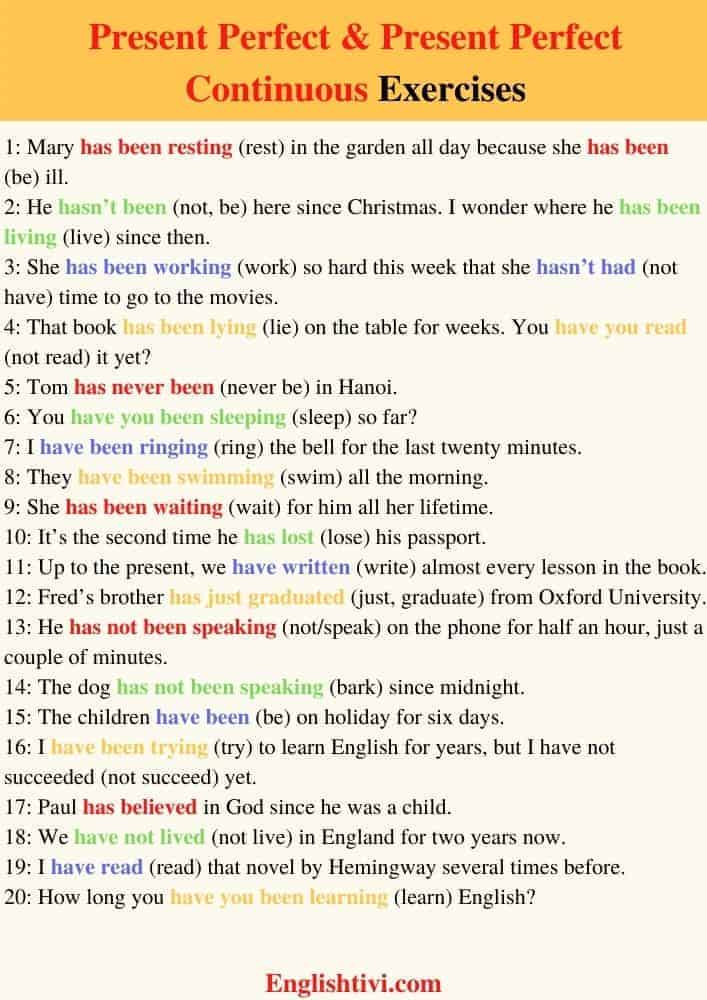In the test, the Present Perfect and Present Perfect Continuous are also a pair that causes many candidates a headache. Let's go over this couple's knowledge and do some exercises to reinforce it. Learn with English tivi on the topic: English Grammar right now!
⏩ Sign Up to Get Bonus
I. Present Perfect Tense
1. Structure of Present Perfect Tense
(+) S + have/has + PII.
(–) S + have/has + not + PII.
(?) Have/Has + S + PII?
- Yes, S + have/has.
- No, S + have/has + not.
2. How to use Present Perfect Tense
2.1. Describes an action that happened at an unspecified time in the past.
– There is no specified time:
- Peter has traveled around the world. (We don't know when.)
- Have you passed your driving test?
– Or go with the words: just, recently, already, yet,…:
- I have just received a letter from my father.
– Action repeated many times up to the present time:
- I have watched “Iron Man” several times.
– After the superlative structure:
- It is the most boring book that I have ever read.
– After the structure: This/It is the first/second… time…:
- This is the first time he has driven a car.
- It's the second time he has lost his passport.
2.2. Describes an action that started in the past and is still in the present.
– There are words indicating time along such as: since, for, ever, never, up to now, so far, etc.
- John has lived in that house for 20 years. (He still lives there.)
- =John has lived in that house since 1989. (Currently 2018)
3. Signal Words for the Present Perfect Tense
– Since + time in the past: since 1982, since January….:
- Since September, I haven't smoked.
– For + duration: for three days, for ten minutes…
- I haven't heard from her for 2 months.
- He hasn't met her since she was a little girl.
– Already: (used in affirmative sentences or questions, ALREADY can come right after have/ has and can also be at the end of the sentence)
- I have already had the answer. = I have had the answer already.
- Have you typed my letter already?
– Yet: (used in negative or interrogative sentences. YET usually comes at the end of a sentence, can be in the middle of a sentence after not)
- John hasn't written his report yet. = John hasn't yet written his report.
- I haven't decided what to do yet. = I haven't yet decided what to do.
- Have you read this article yet? = Have you read this article?
– Just: (used to refer to an action that has just happened)
- I have just met him.
- I have just tidied up the kitchen.
- He have just had lunch.
– Recently, Lately
- He has recently arrived from New York.
– So far:
- We haven't finished the English tenses so far.
– Up to now, up to the present, up to this moment, until now, until this time:
- She hasn't come up to now.
– Ever: (used only in interrogative sentences)
- Have you ever gone abroad?
– Never… before:
- I have never eaten a mango before. Have you eaten a mango?
– In/Over/During/For + the + past/last + time:
- It has rained in the past week.
- She hasn't talked to me over the last 4 days.
4. Difference between “gone to” and “been to”
– gone to
- Ann is on holiday. She has gone to Paris.
- –> Means she is there now or is on her way there.
– been to
- Ann is back to English now. She has been to Paris.
- –> She was in Paris, but now she is back in England.
II. Present Perfect Progressive (Present Perfect Continuous Tense)
1. Structure of Present Perfect Continuous Tense
(+) S + have/has + been + Ving.
(–) S + have/has + not + been + Ving.
(?) Have/Has + S + been + Ving?
- Yes, S + have/has.
- No, S + have/has + not.
2. How to use Present Perfect Continuous Tense
2.1. Expressing an action that started in the past and is still happening in the present, emphasizing the duration of the action (How long)
- She has been working for the same company for 30 years.
2.2. Describe an action that is temporary or may be about to change.
- It has been raining for 2 hours, but I'm sure it will stop.
3. Signal Words for the Present Perfect Continuous Tense
– Usually used with 2 prepositions, “since” or “for“.
- I have been learning English since early morning.
– Other signs to identify the present perfect continuous: all day, all her/his lifetime, all day long, all the morning/afternoon.
- She has been typing letters all the morning.
4. Difference between Present Perfect and Present Perfect Continuous
– Present Perfect: Describes an action that has ended in the present and has a definite result.
- I‘ve waited for you for half an hour. (and now I stop waiting because you didn't come.)
- -> Now I don't wait anymore because you didn't come.
– Present Perfect Continuous: Expresses an action that is still going on in the present and can spread to the future, so there is no obvious result.
- I‘ve been waiting for you for half an hour.
- -> I will keep waiting in the hope that you will come.
See More: Present Perfect Continuous Tense – English Grammar Tenses
III. Present Perfect and Present Perfect Continuous Exercises
Exercises
1: Mary ……………….. (rest) in the garden all day because she ………………..(be) ill.
2: He ……………….. (not, be) here since Christmas. I wonder where he ……………….. (live) since then.
3: She ……………….. (work) so hard this week that she ……………….. (not have) time to go to the movies.
4: That book ……………….. (lie) on the table for weeks. You ……………….. (not read) it yet?
5: Tom ……………….. (never be) in Hanoi.
6: You ……………….. sleep) so far?
7: I ……………….. (ring) the bell for the last twenty minutes.
8: They ……………….. (swim) all the morning.
9: She ……………….. (wait) for him all her lifetime.
10: It’s the second time he ……………….. (lose) his passport.
11: Up to the present, we ……………….. (write) almost every lesson in the book.
12: Fred’s brother ……………….. (just, graduate) from Oxford University.
13: He ……………….. (not/speak) on the phone for half an hour, just a couple of minutes.
14: The dog ……………….. (bark) since midnight.
15: The children ……………….. (be) on holiday for six days.
16: I ……………….. (try) to learn English for years, but I ……………….. (not succeed) yet.
17: Paul ……………….. in God since he was a child.
18: We ……………….. (not live) in England for two years now.
19: I ……………….. (read) that novel by Hemingway several times before.
20: How long you ……………….. (learn) English?
You might also like: Present Simple and Present Continuous
Answers
1: Mary has been resting (rest) in the garden all day because she has been (be) ill.
2: He hasn’t been (not, be) here since Christmas. I wonder where he has been living (live) since then.
3: She has been working (work) so hard this week that she hasn’t had (not have) time to go to the movies.
4: That book has been lying (lie) on the table for weeks. You have you read (not read) it yet?
5: Tom has never been (never be) in Hanoi.
6: You have you been sleeping (sleep) so far?
7: I have been ringing (ring) the bell for the last twenty minutes.
8: They have been swimming (swim) all the morning.
9: She has been waiting (wait) for him all her lifetime.
10: It’s the second time he has lost (lose) his passport.
11: Up to the present, we have written (write) almost every lesson in the book.
12: Fred’s brother has just graduated (just, graduate) from Oxford University.
13: He has not been speaking (not/speak) on the phone for half an hour, just a couple of minutes.
14: The dog has not been speaking (bark) since midnight.
15: The children have been (be) on holiday for six days.
16: I have been trying (try) to learn English for years, but I have not succeeded (not succeed) yet.
17: Paul has believed in God since he was a child.
18: We have not lived (not live) in England for two years now.
19: I have read (read) that novel by Hemingway several times before.
20: How long you have you been learning (learn) English?

Subscribe to the English TV channel on Youtube to improve your English skills!





